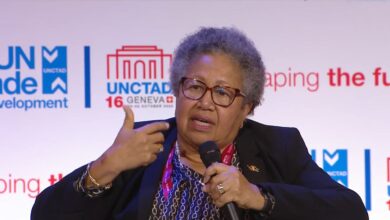(CARICOM Secretariat, Turkeyen, Greater Georgetown, Guyana) In recognition of the benefits derived from the Single Domestic Space (SDS) during the International Cricket Conference Cricket World Cup in 2007, Caribbean Community (CARICOM) Ministers of Transport are recommending its reintroduction.
The Ministers made the recommendation at their just-concluded one-day Special Meeting of the Council for Trade and Economic Development (COTED) on Transportation held in St. Vincent and the Grenadines on Wednesday. Recommendations from the meeting will be presented to Heads of Government at their upcoming 34th Regular Meeting to be held in Trinidad and Tobago from 4-6 July at which Transportation will receive special attention.
The Ministers lamented that CARICOM nationals encountered unnecessary problems as they travelled across the Region and this was not only limited to scant regard paid to the CARICOM Passport which entitles holders to an automatic six-month stay in Member States. The Meeting recognized that there were challenges with respect to frequent security checks and co-operation between the regional airlines, among other things, which negatively affected the travelling public and had repercussions for business and tourism as well. The Ministers also agreed that much work had to be done to improve customer service among Border Control officers in the Region.
The Meeting agreed that the Conference of Heads of Government should be asked to revisit its decision to discontinue the inexpensive arm band system which facilitated hassle free regional travel during the World Cup, The success of that 2007 initiative was alluded to during the discussion, in particular its popularity with the citizens of the Community. A Single Domestic Space (SDS) involving ten CARICOM Member States was established for Cricket World Cup 2007. Among the features of the SDS were, freedom of movement for all domestic travellers and a Special Visa stamped at the first port of entry for travellers from outside the Region to allow hassle free movement among the participating SDS states. Measures to support the initiative included an Advanced Passenger Information System (APIS).
Discussions also centred on a fuel subsidy granted by Trinidad and Tobago to Caribbean Airlines (CAL) which has occasioned complaints of it being anti-competitive, in violation of the CARICOM Multilateral Air Services Agreement and the Revised Treaty of Chaguaramas. Consultations in an effort to resolve the matter amicably will be conducted between the shareholder governments of LIAT and the government of Trinidad and Tobago prior to and during the Conference of Heads of Government Meeting which will be held in Trinidad and Tobago in July.
With respect to air transport, the Ministers underscored the need for deeper collaboration among the regional airlines so that their operations could be better streamlined. Key among the recommendations were for shareholders in the government-owned carriers in CARICOM, beginning with CAL, LIAT and Surinam Airways, to meet in the near future, to discuss how they may rationalise their operations, routes, flight schedules and luggage transfers among other things in the best interests of the consumer.
The Ministers agreed to put forward to Heads of Government that they support the upcoming LIAT application to the Caribbean Development Bank (CDB) for funds to meet the costs of its proposed re-fleeting exercise, which is required to sustain its operation and improve its service. They also recommended that air transport services be included among the group of essential services and the necessary legislation be enacted to give effect to this reality.
The Meeting established a team, chaired by St. Vincent and the Grenadines, to review elements of a draft policy or air and maritime transport and asked Member States to submit their comments by the end of June.
Ministers also held discussions on transportation for agriculture produce and identified the need for coordination between farmers/producers and shippers in order to curb high costs. The issue had been referred to Transportation Ministers by Ministers of Agriculture and is to be examined by a team from the Caribbean Shipping Association, airlines and agriculture producers/exporters.
The Ministers agreed that they would keep under review on-going initiatives such as the proposal for a Fast Ferry Service in the Southern Caribbean.





